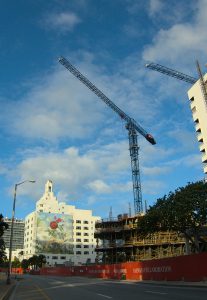 The legal principle of respondent superior makes employers liable in civil damages for the negligence of their employees.
The legal principle of respondent superior makes employers liable in civil damages for the negligence of their employees.
The typical large-scale construction project is manned by workers employed by many different companies. However, the theories of vertical and horizontal immunity contained in Florida Statute Sections 440.10(1)(b)&(e) exempt construction site employers from respondent superior liability for worker on worker accidents.*
The remedies recognized under Florida’s civil justice system are different than those available under the state’s workers’ compensation system. Two of the biggest differences: the civil justice system compensates for pain and suffering and the loss of future earning capacity, the workers’ compensation system does not.
In many cases, an injured worker can get closer to being made whole through civil rather than workers’ compensation remedies. However, because of sections 440.10(1)(b)&(e), most construction site contractors and subcontractors are immune from civil liability. See section 440.11 Florida Statutes. The exceptions to this rule are when the employee has been grossly negligent or there has been a failure to secure workers’ compensation as required by Chapter 440.
Vertical immunity is addressed in Section 440.10(1)(b). It is a well-settled doctrine, requiring contractors to be liable for and to secure workers’ compensation for their employees in exchange for the “exclusiveness of liability” doctrine encompassed in 440.11. It affords immunity to the contractor and all subcontractors below it with a direct vertical connection to the injured worker. For example, a contractor may hire a subcontractor to perform a certain job, and that subcontractor may in turn retain another subcontractor to perform aspects of the job. All have the 440.11 immunity.
Horizontal immunity (440.10(1)(e)) was adopted in 2003 as part of Jeb Bush’s effort to shield employers and workers’ compensation insurance companies from responsibility. It eliminates the direct, vertical link requirement between company and worker, effectively extending immunity to every construction site employer. In Amorin v. Gordon, 996 So. 2d 913 (Fla. 4th DCA 2008), the statute survived a constitutional challenge.
Negligence laws serve two purposes: make a damaged person whole and deter negligent behavior. While the workers’ compensation system does provide benefits, its immunity provisions limit the most serious consequences of negligent conduct. This should be discouraged as bad public policy.
Pre-440.10(1)(e), employees were eligible to seek workers’ compensation benefits from vertical employers and recover civil damages from negligent horizontal employers. (§ 440.39 prevents double, or windfall, recoveries.) No longer. Although employees may continue to seek workers’ compensation from vertical employers, § 440.10(1)(e) bars civil recoveries from horizontal employers. Hence, injured employees gain nothing from § 440.10(1)(e).
In 1983, the Florida Supreme Court, in Employers Insurance of Wausau v. Abernathy, 442 So.2d 953 (Fla. 1983), gave the reasoning for limiting the granting of immunity:
The justification for limiting liability or granting immunity is the substitution of something else in its place, a quid pro quo. The duty to provide workers’ compensation benefits supplants tort liability to those injured on the job. If the duty to provide such coverage does not exist, then one has no reason to expect immunity from wrongdoings committed against a third party…. [W]e recede from Younger …, thus allowing a third-party action against one who has no duty to afford compensation benefits.
While the subject matter of the Abernathy case was vertical immunity, the reasoning applies even more so with regard to horizontal immunity. By amending the law in 2003, Florida Republican legislators chose to ignore the Supreme Court’s sound reasoning. Such is the state of Republican politics in Florida — individuals losing rights without receiving anything in return. This is contrary to the letter and spirit of the workers’ compensation system, created in Florida in 1935 on the principle of fair mutual reciprocity between employer and employee.
*The same principles apply in non-construction settings. See Ramcharitar v. Derosins and McCollough v. Bush.
****************************
Contact us toll free at 866-785-GALE or by email to learn your legal rights.
Jeffrey P. Gale, P.A. is a South Florida based law firm committed to the judicial system and to representing and obtaining justice for individuals – the poor, the injured, the forgotten, the voiceless, the defenseless and the damned, and to protecting the rights of such people from corporate and government oppression. We do not represent government, corporations or large business interests.
While prompt resolution of your legal matter is our goal, our approach is fundamentally different. Our clients are “people” and not “cases” or “files.” We take the time to build a relationship with our clients, realizing that only through meaningful interaction can we best serve their needs. In this manner, we have been able to best help those requiring legal representation.
 Florida Injury Attorney Blawg
Florida Injury Attorney Blawg

